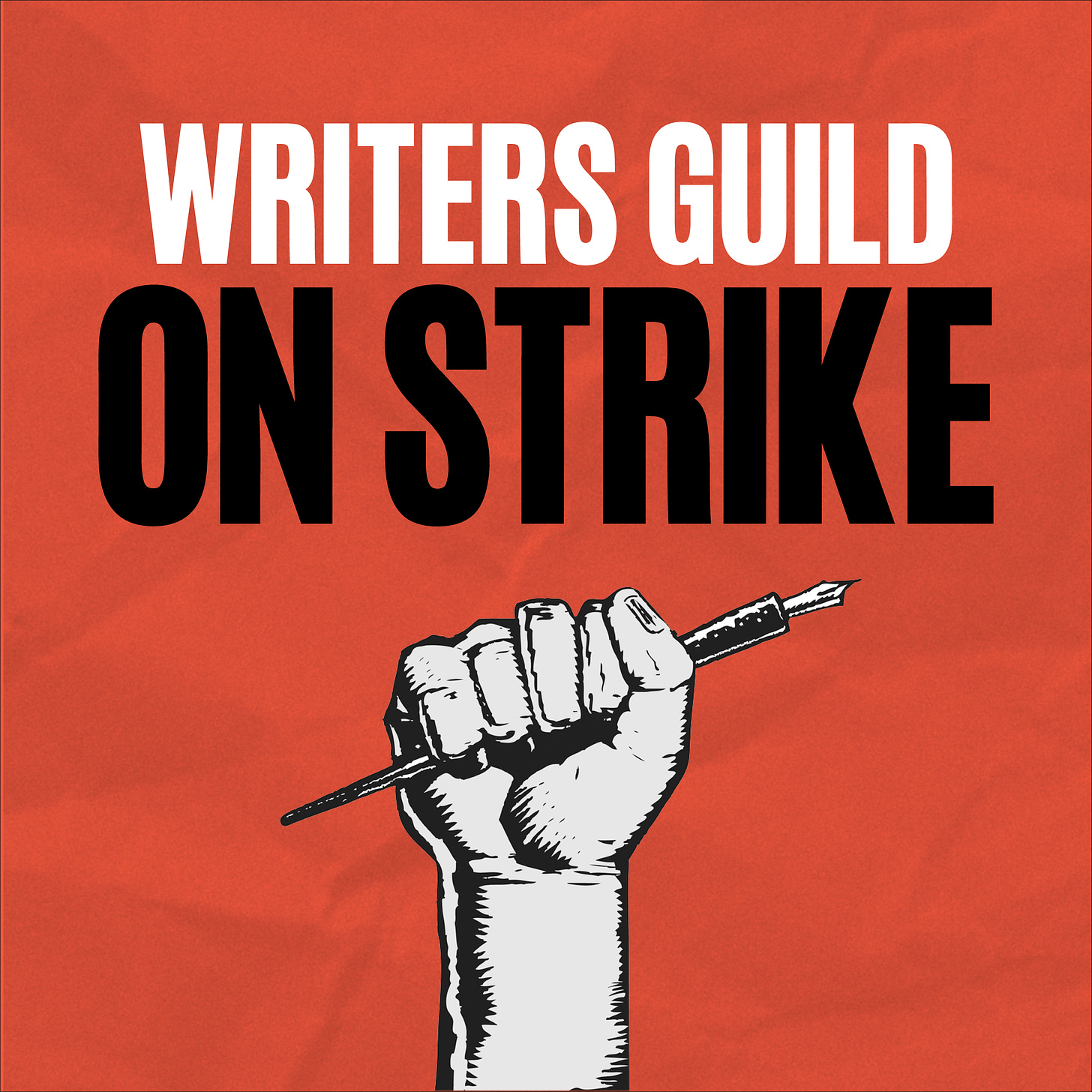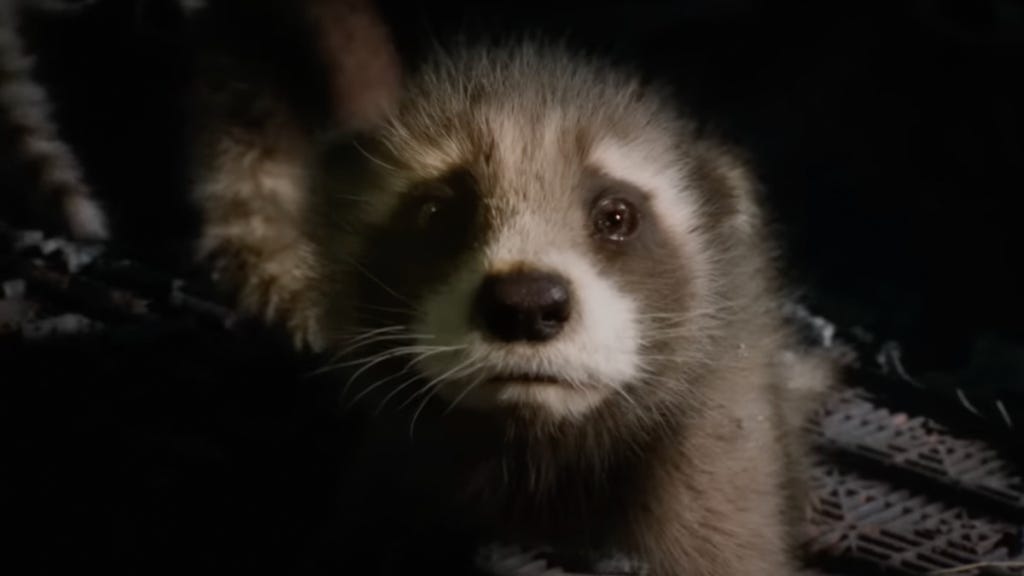Midweek Update: Strike
The Writers Guild of America is on strike, and the future of entertainment is at stake.
“It starts with the script,” is an old Hollywood adage, one meant to both honor writing while obscuring the writer. Writers are an essential part of entertainment, but in Hollywood, they’re also pretty low on the creative totem pole. They’re frequently fired, swapped out, and have their works glued together by other creatives ranging from actors and directors to studio executives who have notes. This isn’t inherently a bad thing; filmmaking is a collaborative art form, and if you want to keep full control of your writing, there are other mediums for that.
However, after the era of “Peak TV” where shows like Mad Men and Breaking Bad made television the hot destination for creatives, the streaming landscape has transformed the profession into a joyless slog plagued with instability. The future doesn’t look much brighter, which is why the WGA has gone on strike after failing to reach a deal with the studios. 97.85% of members authorized the strike, and it’s hard to get 97.85% of people to agree on anything, so that should tell you how dire the situation is right now.
The studios would love a future where writers are minimized as much as possible by technology and stagnant wages so that people are left fighting over the crumbs (we’ve already seen this happen in media, and the results have been less than stellar). There is an idealized future for the studios where they’ve maximized profit by pumping an idea into an A.I., paying a writer as little as possible to make it remotely readable, and then tossing the script over to a VFX house where deepfake actors will perform the words and out comes an IP product. It’s the way you look at the world when you see film and television not as art that enriches the soul but content that distracts from daily toil. It is the “second-screen” experience where you don’t engage with anything, but it plays in the background while you look at another thing on your phone. It is a world where entertainment is as disposable and destructive as fast fashion.
I’m sure in the weeks to come, those carrying water for the studios will try to make this a case of “millionaires vs. billionaires” or argue that writing isn’t a strenuous job or that the market can’t bear the writers’ requests, and all of that is nonsense. The writers have laid out their demands pretty clearly and you can see the studios’ unwillingness to engage in basic stuff like, “Don’t replace us with A.I.” kind of gives the game away.
We need economies where we don’t grind people into dust. When we pay people what they’re worth rather than exploiting them, we all benefit from a greater product. Even if the studios got everything they wanted, it’s not like they would pass the savings on to the consumer. It would simply result in a higher share price for Wall Street, and meanwhile the rest of us are paying more for worse entertainment. Prices for streaming are going to rise anyway, so shouldn’t they at least be attached to writers who are not only fairly compensated but also able to pave the way for the next generation of writers?
We all have favorite movies and TV shows. Unless you exclusively watch documentaries and reality TV, then those favorites came from writers who should earn a living not only on what they wrote, but on the residuals from that film or TV show enduring and living on through new mediums. This is a good transaction. You’re paying for nourishment, and you deserve a meal prepared by a well-paid chef, not a plate of sawdust and glass cobbled together by a machine with a tired busboy pulling the lever.
It starts with the script. The script starts with the writer.
What I’m Watching
I was going to devote the main part of this Substack to Guardians of the Galaxy, Vol. 3, but I felt like A) the strike was way more important; and B) I’ve been doing a lot of Marvel-bashing lately even though I quite liked GOTG 3. It feels like it’s an odd film to tie to the larger MCU since it has no characters outside the GOTG-verse (and oddly makes their appearance in Thor: Love and Thunder even more misbegotten) or sets up any future MCU plot lines. Like Guardians of the Galaxy, Vol. 2, it’s a pretty standalone story.
I’m a bit torn on Guardians 3 because I think overall it works. It’s gorgeous to look at, it’s funny and emotional in equal measure, and feels like a good conclusion to the story writer-director James Gunn was telling about these characters. And yet, I don’t know if I’ll ever rewatch it. The animal cruelty part of the story—basically all the stuff dealing with Rocket’s origins, is incredibly difficult to watch. Like seeing a baby raccoon with a bunch of metal put into its body and having his first word be, “Hurts…” kind of broke me a little bit. I think it’s fine to have stories go to darker places, but I’m reluctant to go back to this one even though I think it’s a pretty good film.
What I’m Reading
Who Could Mistake Tucker Carlson for Anything Else? by David Roth [Defector] - The abrupt firing of Tucker Carlson from Fox News last week was cause for much rejoicing (although he’ll probably land on his feet because guys like him typically do), and Roth had the best read on who Carlson is:
Carlson acts like a Republican for a living, for short, and as that has changed, he has changed along with it. Lately this has been a matter of descending and descending again into various sub-basements, taking a look around, and then hitting his mark as usual.
Younger readers may not know that during the “War on Terror” Carlson was a gung-ho Neo-Conservative guy who fully embraced colonizing the Middle East and the American Empire, and when that idea passed out of fashion, he abandoned it and moved on to the next grift. He doesn’t believe in anything, and it would be a mistake to consider him as anything other than an opportunistic nihilist.
Homeless in the City Where He Was Once Mayor by Mike Baker [The New York Times] - This is a remarkable work of reporting with a tragic arc. It helps crystalize the conflict between the personal and the public and how in America, we rarely do the work we need to protect the most vulnerable. Craig Conyer worked to help the city of Bend, Oregon, but there were no resources to grapple with his mental illness or provide a safety net so he could keep his home.
The Archnemeses of War Rugs by Decca Muldowney [The Verge] - My pals Roxana Hadadi and Russ Fischer put this story on my radar. It’s basically about a couple white guys arguing over who has the rights to a traditional mode of artistic expression dating back hundreds of years produced impoverished people.
What I’m Hearing
The National’s First Two Pages of Frankenstein is now out, and it’s pretty good! Listen for yourself:
What I’m Playing
I think my interest in Hitman is starting to peak at just the right time. The number of assassinations you have to do to earn level mastery is starting to feel like a grind. Thankfully, new Zelda arrives next week, and I’ll be curious to see how I manage it without the help of a strategy guide (I needed that handholding to find my way through the vastness of Breath of the Wild).





